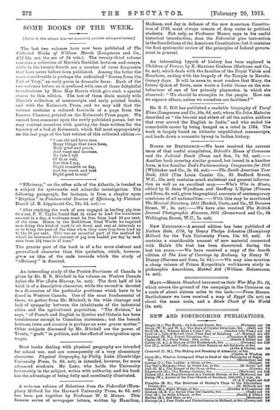"Efficiency," on the other side of the Atlantic, is treated
as a subject for systematic and scientific investigation. The following paragraph, for instance, is from a chapter upon "Rhythm" in Fundamental Sources of Efficiency, by Fletcher Durell (J. B. Lippincott Co., 103. 6d. net)
"After studying studying the work of men engaged in loading pig iron on a car, F. W. Taylor found that in order to load the maximum amount in a day, a workman must be free from load 53 per cent. of the time. Hence in the Bethlehem Steel Works he required men doing this kind of work to sit down and rest at intervals so as to bring the part of the time when they were free from load up to the 58 per cent. This was an essential part of the method by which be increased the amount of pig iron loaded per day by each man from 124 tons to 47 tons."
The greater part of the book is of a far more abstract and generalized character than this quotation, which, however, gives an idea of the ends towards which the study of "efficiency" is directed.






































 Previous page
Previous page